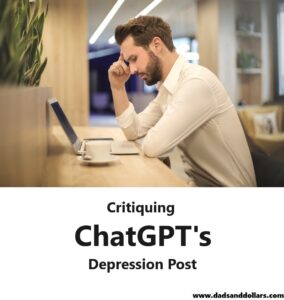In the previous post, I asked ChatGPT to write 1000-1500 words about depression and financial independence. (I have one of those; unfortunately, the one I have is not the financial independence.) I promised to add my personal take to ChatGPT’s ideas and see how close it came to describing my situation.
So, how did ChatGPT do? Let’s find out.

So…my situation has changed in the several months since I had ChatGPT write this post. We’ll discuss those changes in a future post. (Really!) That doesn’t necessarily mean that its points are not correct.
What ChatGPT Got Right in Its Intro
Let’s just start with ChatGPT’s introduction to the interrelationship between depression and financial independence:
It’s the idea of having enough wealth to support oneself without relying on traditional sources of income, such as a job. But for those struggling with depression, this can seem like an impossible dream.
This, I can safely say, is spot on. But since this was from the introductory paragraph, ChatGPT obviously expanded on this:
People who struggle with depression often face a constant battle against negative thoughts, low energy levels, and a lack of motivation. This can make it difficult to find the drive and focus needed to make smart money decisions, let alone work towards a goal like financial independence.
Lack of motivation? Check, check, and check. Witness, for example, the fact that it has been over half a year, and I am finally getting back to responding to ChatGPT’s post. Yes, there’s stress playing a part as well (again, I’ll address some of the stress-related stuff in a future post), but depression is paralyzing at times, such that all I can do is to drag myself to work (it’s only out of a strong sense of obligation to my family that I don’t just stay under the covers all day) and then drag myself home again. My exciting life.
In fact, ChatGPT spoke to that as well:
One of the biggest challenges of reaching financial independence while struggling with depression is simply finding the energy to get started. For many people with depression, getting out of bed and facing the day can be a Herculean task, and the thought of working towards a long-term financial goal can seem overwhelming.
Yup.
But Do ChatGPT’s Strategies Help?
ChatGPT went from its intro right into its own suggested strategies. I’m gonna list them out of order because I think the second one is more important:
[A] strategy for overcoming the challenges of depression is to seek support from friends, family, or a mental health professional. This can be especially helpful if you are struggling with negative thoughts or feelings of hopelessness.
This. All of this. I do much better with my depression if I am connected to other people. Family is great for me, of course, though your mileage may vary. But even having small conversations at work can ground me and take away the sky-is-falling, woe-is-me attitude that affects me when I’m by myself and dealing with an onslaught of depression.
With that said, some workplaces are overtly opposed to any such small talk. I worked at a company where, if I happened to be away from my desk, having a two-minute discussion (yes, two!) about something not work-related (“how was your weekend”?), I would be called out by my supervisor (“Hey! What are you working on?”) and made to feel guilty for not wanting to be an obedient little robot. That is part of the situation that has changed, so, again, more on that later.
But here’s my strategy for you if you feel the need to connect to other people to keep yourself grounded (and you should feel that need) but are stymied by a workplace that doesn’t allow it: CHANGE JOBS.
Now, ChatGPT listed the following strategy first, but it won’t do much good if you keep yourself isolated from everyone, listening to your own spiraling thoughts:
[B]reak your financial goals down into smaller, more manageable tasks.
While moving away from an all-or-nothing plan for financial independence can be helpful, it won’t make a bit of difference if your inner voice is telling you, without any external ones to refute it, that you’re never going to make it. Heck, even the FI community on Twitter is helpful, even though they’re not there with you in person. Just don’t try to do it alone.
Actually, that last sentence is valid a vast majority of the time, in any situation.
Yes, But…
And then ChatGPT went on to, in my opinion, almost repeat itself:
In addition to seeking support from others, it’s important to take care of yourself physically and emotionally.
If you ask me. connecting with other people is a huge part of taking care of yourself emotionally.
As for the physical part, that’s not easy for a lot of us with depression. (“Exercise? How about no?”) Thankfully, both my previous and current jobs offer fairly nice places to take walks during lunch, which also helps me get some sunshine after being under artificial lights all morning. Just doing that can be helpful. Obviously, if your situation and your current emotional state allow you to do more, then by all means, go for it.
ChatGPT Names Another Real Challenge
Honestly, it’s rather scary as to how well ChatGPT described my situation. It continues:
Another challenge of reaching financial independence while struggling with depression is the tendency to make impulsive or emotionally driven money decisions.
That sounds familiar. (Hello, day trading!) And ChatGPT goes on to recommend finding a professional financial planner, which I’m trying to do right now anyway (because some of my accounts are currently managed by someone who has literally never called me).
Finally, it’s important to remember that reaching financial independence is not something that happens overnight.
“Yeah, yeah, yeah, patience. How long will that take?” Ed Gruberman is apparently my spirit animal.

And I’ve certainly taken a lot of boots to the head. (Album ℗1987, 1996 Attic Records Limited. Buy it here.)
So, Does ChatGPT Think I’ll Make It?
ChatGPT appears to be more confident in my chances that I am some of the time, though that may very well be the depression talking. ChatGPT says:
In conclusion, reaching financial independence while struggling with depression can be a challenging journey, but it is possible with the right tools and support.
Here’s hoping it’s correct.
Note: this post may contain affiliate links. And honestly, it probably does. View my affiliate link disclaimer here.